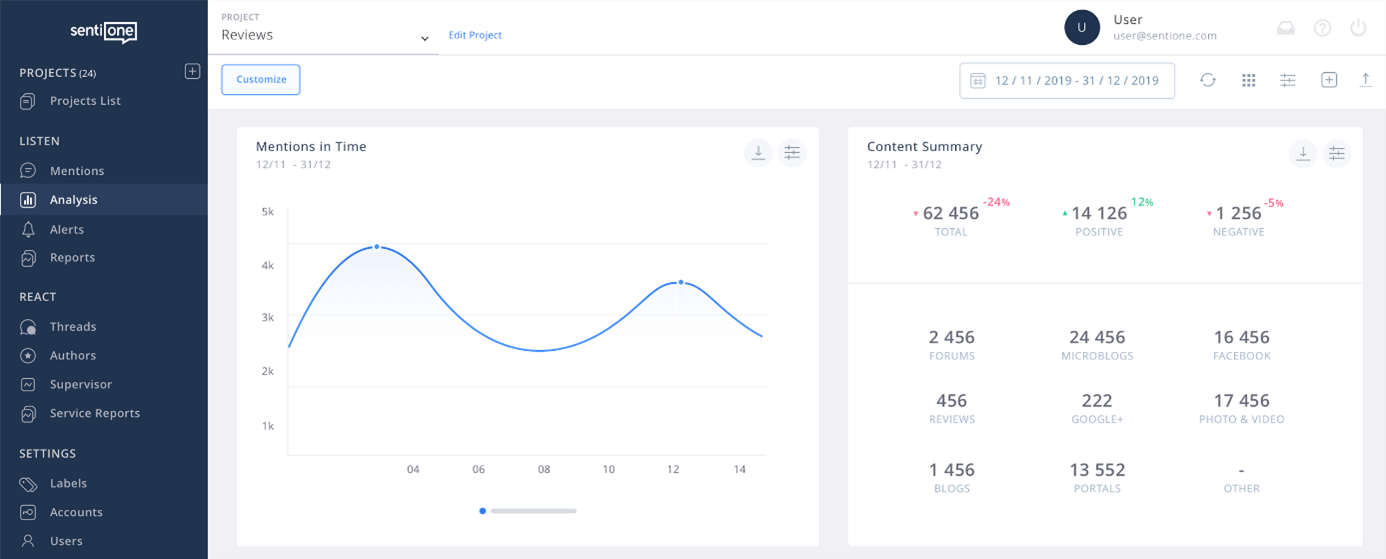7 essential tools for your online store
Whether you are just setting up an online shop or have been involved in e-commerce for some time, there is no doubt that you have one key goal: to make as much profit as possible from sales. We are not setting out to discover America with this statement – after all, it is the primary goal of every entrepreneur. However, if you are in the e-commerce business, it is easier because there are a number of solutions that can help you achieve your goals by streamlining your e-commerce processes and, consequently, your sales. Below we present you with tools for your e-commerce store that are definitely worth implementing and using on a daily basis.
1. SentiOne – because reputation matters
We had to start our compilation of the best e-commerce tools with a brief introduction to our web and social media monitoring solution, SentiOne. You can use it to track in real time what is being said about your brand and products or services (and your competitors!) online – and in a variety of sources such as blogs, forums, social media and more. With such a feature, you can constantly manage your reputation by monitoring brand mentions and responding quickly to negative comments. The tool also gives you the ability to react quickly in crisis situations (thanks to the ability to set alerts when the number of brand mentions increases dramatically or the brand is associated with a crisis word, such as bullying or data leakage).
And that’s not all! SentiOne also tracks social media trends to help you understand consumer needs and how opinions about your brand are changing over time. What’s more, the tool gives you a range of data to analyse, allowing you to plan more tailored activities, particularly marketing and communications, to meet your audience’s expectations.

Have the possibilities of SentiOne piqued your interest? You can always make an appointment for a free demo where we will show you the interface and discuss all the key features of SentiOne. Believe us, using this tool will bring you many positive results!
Click here to schedule an appointment and activate your free SentiOne demo.
2. Mailchimp – because you want to send effective messages
Want to create, send and track effective email marketing campaigns? That’s what Mailchimp, another tool for your online shop, allows you to do. It will help you prepare personalised messages for your recipients. It is equipped with the following features.
- Email marketing campaign builder
MailChimp offers an easy-to-use wizard for creating different types of email campaigns, such as newsletters, promotions, event invitations or product alerts. What’s more, the platform comes with a number of pre-designed email templates that you can customise to suit your needs. This allows you to quickly and efficiently create professional messages targeted to your audience.
- Email marketing automation
The platform allows you to create automated email campaigns that are sent at specific times based on recipient actions or behaviour, such as welcome emails, shopping cart abandonment reminders or birthday discount code messages.
- Segment customers
MailChimp allows you to segment your subscriber list based on a variety of criteria, such as buying behaviour, preferences or geographic location. The result? You can send more personalised messages.
- Analyse results
This e-commerce tool also provides you with reports on the effectiveness of your email campaigns – including open, click-through, unsubscribe and bounce rates – so you can track results and adjust your marketing strategy.
If you rely on email marketing campaigns to build customer relationships, communicate with your audience on an ongoing basis and support sales, MailChimp is perfect for you!
3. Google Analytics (now GA4) – because analytics is key
GA4 appears to be a basic (and free!) data analysis solution for any ecommerce store – but that doesn’t mean businesses remember it or know all the possibilities it offers them. That’s why it’s definitely worth mentioning in the list of best e-commerce tools and a reminder that it allows you to analyse virtually any user behaviour on your e-store.
What can you measure with GA4? The number of visits, unique users, time spent on the site, sources of traffic to your store – these are just some of the metrics you can monitor. With this tool from Google, you’ll also know exactly what actions users have taken on your site: from browsing to clicking on links or buttons to navigating your site. You’ll also get a range of information about them: demographics, interests, behaviour or the devices they use. And these are just the basic possibilities!

Source: Google Analytics
Click here to schedule an appointment and activate your free SentiOne demo.
With Google Analytics, you can gain a better understanding of user behaviour in your store and adjust your strategy accordingly. You’ll also be able to evaluate the effectiveness of your past marketing efforts – and use the data to make more accurate business decisions in the future. This e-commerce tool is so versatile and all-encompassing that any business, regardless of sector or size, can find a way to use it and optimise its presence in the online world!
4. Senuto – because SEO is still a must
When listing e-commerce tools, we can’t forget the important area of SEO! In this respect, Senuto is a popular solution for those who want to improve the visibility of their websites in search results. This solution helps to analyse and optimise websites for search engines, especially in the context of suggesting high-potential keywords.
What’s more, Senuto offers functions to perform a technical audit of an online store for SEO optimisation (including checking for errors, identifying indexing problems and suggesting possible improvements). It also allows you to monitor the links that lead to your site.
In this way, Senuto provides the online shop with a tool to help increase organic traffic. Impact on sales? Absolutely!
5. Hotjar – because you need to study user behaviour
You’ve set up an online store, created content, placed graphics, buttons, forms and CTAs and you’re happy with the end result? Great – but your work doesn’t stop there. You need to find out what the user experience of your e-store is like. If it is not positive, they may well leave. By the same token? Conversions won’t happen.
Hotjar, an online store tool for analysing user behaviour, can help. This solution provides information about how users interact with your site, giving you a basis for improving a potential customer’s experience during a visit.
How does Hotjar analyse user behaviour? It uses several key features to do this.
- Heat Maps – Heat maps show where users click, swipe or browse during their visit. This helps us identify areas where users are having difficulty or content that is not engaging.

Source: Hotjar
- Session Records – Session records allow you to see how users interact with your website, allowing you to diagnose errors and usability issues.
- Forms – Hotjar can also track how users interact with forms on the site, which in practice means if there are problems with filling in the last step before conversion.
- User Surveys – The tool also allows you to gather user opinions through various types of surveys.
Through these features, Hotjar helps you understand the behaviour and needs of users when they visit your site. This provides valuable insights into how to optimise the site for UX. Why is this important? Because a better user experience in an online store increases the likelihood that the user will take the action we care about most.
6. SalesManago – because automation makes things easier
When running an online store, it is also worth taking care to automate some of the processes, and a tool like SalesManago can help. This marketing automation platform allows you to
- Create automated marketing campaigns that are sent based on certain conditions and customer behaviour (e.g. welcome emails, reminders for abandoned shopping carts, messages related to the purchased product),
- Tailor content, offers and product recommendations to individual customer preferences and behaviour,
- Segment the customer base based on various criteria (including purchase behaviour, preferences or geographic location) to send more targeted and personalised messages,
- Automatically suggest products to customers based on their preferences and purchasing behaviour,
- Track customer activity and manage customer relationships (thanks to built-in CRM).
SalesManago has many of the features typical of email marketing tools (such as MailChimp, discussed above), but goes one step further. Less work for the marketing and sales departments of an online shop? Absolutely.
7. LiveChat – because easy access to service builds engagement
Last but not least – LiveChat, an online store tool for live customer service. But wait, what does “live” mean? LiveChat allows you to chat with customers in real time via a chat on your website. It’s a popular solution used by many businesses – especially online stores – to provide fast and effective customer service and increase user engagement. After all, getting help quickly and, most importantly, efficiently is the number one way to increase customer satisfaction when they contact a business.
Tools for eCommerce – Summary
Still wondering how analytics, web monitoring or automation tools can help your ecommerce sales? You may not see it at first glance, but each of these tools improves the way your business operates. At the same time, they provide a wealth of data for analysis, allowing you to make better business decisions, especially in marketing and sales. So if you’re looking to improve your results, it’s definitely worth looking at tools like the ones listed above to help with the most basic processes. So which one will you reach for first?



